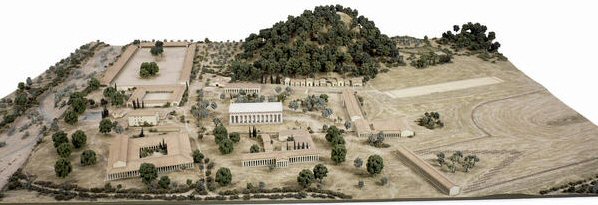|
The games in Olympia
(776 B.C.-393 A.D.) Every four year, for about 1000 years (776
B.C.-393 A.D.), in Olympia games were held, that became the most famous sport
event in the ancient world. In 393 A.D. the Christian emperor Thedosius forbid
the games because he thought they were a pagan institution.
The games were that much important that even
wars came to a hold. Participants and attendants must be guaranteed a save
journey to Olympia. Therefore messengers were sent out from Elis (the
district of Olympia) to announce a sacred truce of one month before the festival
began. In modern times the olympic games were
cancelled three times because of wars (1916, 1940 and 1944).
Why were the games held in the district of Elis?
Elis was a small, distant district without much political or military power. The
was little chance that the glory of the games would enhance the power of Elis.

De Coubertin and the modern games
At the end of the nineteenth century the French
baron Pierre de Coubertin thought it a good idea to revive the games. In 1870-1871
France was beaten in a war with Germany. According to De Coubertin one of the
reasons for this defeat was the fact that the youth of France did not take part
in sport that much.
Only fysical fitness and a good sport moral would bring France back at the top
of the world. Furthermore the games would contribute to international
understanding, brotherhood and peace. Of course the games were only for amateurs
and fair play should be a key issue during the games.
Big differences between the
ancient and modern games
In
1896 the first modern olympic games were held in Athena, for practical reasons
Olympia was not suited for the games. 285 participants were competitive in 42
events in 10 sports. Only running, long-jump, discus, and wrestling were events
in the ancient as well as the modern games.
The marathon, won by the Greek Spyridon Luis,
was never ever an event during the ancient olympic games. To be honest, there
were more differences than similarities between the ancient and the modern
olympic games.
To De Coubertin not
the reality of the ancient games was important, but an Olympic 'spirit' he
thought appropriate.
|